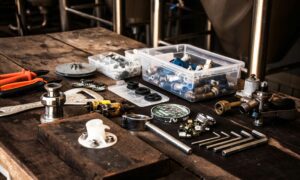Proper Use, Better Performance: The Right Way To Use Garbage Disposals
Is your garbage disposal working as well as it could?
Many homeowners treat garbage disposal with a hands-free and plug-and-play approach. Just turn it on and dump in the scraps, right? This kitchen appliance, however, can cause disaster if misused.
Let’s examine why proper use matters and how you should use your garbage disposal at home.
Why Proper Use Matters
Using a garbage disposal correctly keeps your kitchen cleaner while minimizing the need for repairs. Here’s why this matters:
- Prevents Clogs and Breakdowns: Misuse can lead to clogging and even motor burnout. A garbage disposal should only handle small food scraps.
- Extends Appliance Life: When used properly, a garbage disposal can last up to 10-15 years. Improper use may cut its life short.
- Keeps Your Plumbing Safe: Plumbers install garbage disposals underneath kitchen sinks, connecting them to the plumbing system. Throwing the wrong items down your garbage disposal can lead to pipe damage and sewage backups.
Proper use saves you from the hassle of unit downtime.
How to Use a Garbage Disposal the Right Way
There’s more to using a garbage disposal than pressing a switch. Here are the steps to follow every time:
- Turn on Cold Water: Before you even turn on the disposal, run cold water. Cold water solidifies any fats or grease, allowing them to pass through more easily without coating the blades or pipes.
- Gradually Feed Small Amounts: Don’t overload the disposal. Place small portions of food waste at a time, allowing each to grind completely before adding more.
- Keep the Water Running: Let the cold water continue to run for about 15 seconds after turning off the disposal to flush away any remaining debris.
- Use Ice Cubes Periodically: Grinding ice cubes helps sharpen the blades, keeps them clean, and removes buildup in the grinding chamber.
These steps reduce the likelihood of waste buildup and system breakdowns.
What Should Go Down Your Garbage Disposal?
Not all food waste is safe for a garbage disposal. Avoiding certain materials can significantly prolong your disposal’s life and prevent plumbing issues.
- Safe to Grind: Soft foods, small scraps, citrus peels, and ice cubes are generally safe.
- Avoid:
- Fibrous Foods: Celery, corn husks, and onion skins can tangle the blades.
- Grease and Fats: These will solidify and cause clogs.
- Bones and Shells: Hard items can damage the disposal’s blades.
- Pasta and Rice: These expand with water, potentially clogging pipes over time.
Sticking to this list keeps your disposal free from items it wasn’t built to handle, ensuring smooth operation and fewer issues.
What if You Don’t Use the Garbage Disposal Properly?
Neglecting proper use can lead to several common, costly issues that may require professional repair or replacement. Here’s what you could face:
- Frequent Clogs: Food particles can accumulate in your disposal and drain line, creating tough-to-remove clogs.
- Dull Blades: Over time, grinding items like bones or shells will dull your blades, causing inefficient grinding and potential motor strain.
- Motor Burnout: Overloading the disposal or grinding large, hard objects can wear out the motor, leading to early burnout.
- Unpleasant Odors: Food remnants left in the disposal can cause bad smells in your kitchen, especially if grease or proteins get trapped and begin to decompose.
Proper use can help avoid these common issues, keeping your disposal functioning effectively for years.
When to Call a Professional
Even with the best care, your garbage disposal may occasionally need professional care. In extreme cases, it may even require emergency repairs. Here are signs it’s time to call professionals:
- Unusual Noises: Stop using the garbage disposal if you hear grinding or rattling sounds. It may be caused by an obstruction or a broken component.
- Frequent Clogs: Frequent clogging can indicate more serious issues.
- Water Leaks: If water is leaking from the disposal, it may need to be replaced or resealed.
- Motor Issues: If the disposal won’t turn on, or if it repeatedly trips the breaker, the motor may be failing.
A professional can diagnose and fix these quickly, saving you time and preventing potential water damage.
A garbage disposal makes cleanup faster and more convenient. Proper use, coupled with simple maintenance from a reliable plumbing company, can keep your kitchen running smoothly. Be sure to use your garbage disposal correctly. Doing so allows your garbage disposal to work optimally while you focus on more important aspects of homeownership.

































